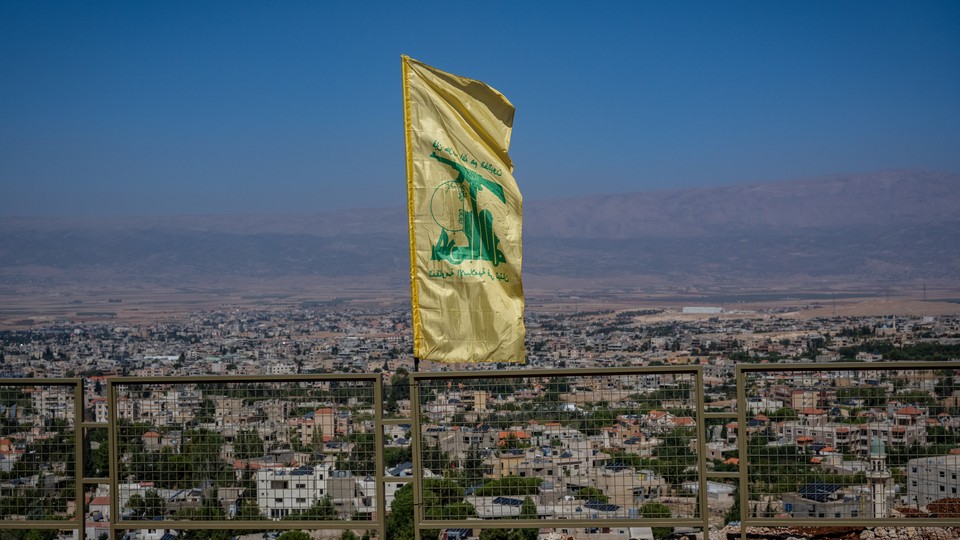Israel’s ‘Hand of God’ Operation
5 min read
In the 1960s, a Syrian defense official visited the Golan, the country’s border with Israel, and advised planting nonnative eucalyptus trees near the sites of its artillery, to provide concealment and shade to Syrian soldiers. But that official turned out to be an Israeli spy. He was found out and executed in 1965, but his landscaping ruse may have made “aim at the eucalyptus trees” a reasonable first set of orders for Israeli artillery during the war between Israel and Syria two years later.
Getting your enemy to identify its positions for you is two steps less ambitious than what Israel appears to have done in recent months, which is to get the enemy to identify its positions, purchase your bombs, and place them next to its own members’ groins. In Beirut and elsewhere in Lebanon yesterday, Hezbollah members found their pagers beeping, then heating up, and then exploding. (A second round of explosions was reported today.) Earlier this year, Hezbollah’s leader, Hassan Nasrallah, had ordered members to stop using cellphones, because Israel might be able to use them as tracking or bugging devices. “Shut [your phone] off, bury it, put it in an iron chest, and lock it up,” Nasrallah said, in a rare point of agreement with the Atlantic contributor Jonathan Haidt. Hezbollah replaced them with pagers. Israel appears to have meddled with the supply chain and packed the pagers with explosive charges. The videos posted online show dramatic injuries: fingers blown off, faces streaked with blood, burning holes in torsos. So far 12 have died. According to Hezbollah, one of the dead was a girl of 9.
A certain type of spy operation is known as a “hand of God,” because to its victims it seems to come with such sudden and precise violence that it may as well have been a thunderbolt. The Iranian general Qassem Solaimani was struck dead in such an operation in Baghdad in 2020, as was Hamas’s political leader, Ismail Haniyeh, in Tehran in July. (Hezbollah, like Hamas, is allied with Iran.) Everyone presumes that mortals in Israel are responsible for Pager-geddon, but the aura of divine wrath is the same, except here multiplied by a factor of a thousand or more.
The deaths and smoking crotches have direct effects—key leaders killed, operatives injured—as well as indirect ones. Hezbollah was once known for its relative openness to outsiders. Twenty years ago, to interview an al-Qaeda operative, a journalist might have to surrender his phone and be driven around Karachi blindfolded. But to talk to Hezbollah, one could just go to Lebanon (or Paraguay, or Sierra Leone) and walk into an office run openly by the organization or its agents. That is no longer the case. Even before its pagers started blowing up, the group had locked down and stopped talking to outsiders, out of the very reasonable concern that the outsiders might wittingly or unwittingly guide more thunderbolts, like the one that struck dead the group’s military chief, Fuad Shukr, in July.
(Consider, incidentally, the calculation that the Israelis must have made about when to detonate all those pagers. They must have been tempted to blow them up as soon as they were in place, because the longer the Israelis waited, the more likely that Hezbollah would have detected the explosives. But the longer the pagers were in place before detonation, the more devastating the psychological effect. It is unsettling enough to know that your enemy found his way into the front pocket of your skinny jeans. It is even worse to know that he has been there for five months.)
A military organization can be crippled by the perception that everyone you meet might be a spy and that your pager or fax machine might be waiting for instructions to kill you. Suddenly nothing animate or inanimate is above suspicion. This pervasive distrust is the desired outcome. In the 1960s, the United States tampered with crates of ammo destined for the Viet Cong and replaced individual cartridges—one bullet, and the gunpowder that sends it flying—with cartridges packed with high explosives. When that cartridge reached the chamber of an AK-47, it blew up and disabled the weapon and its operator. The point was not to wound one soldier. It was to make the whole supply chain suspect, and to make every other soldier wonder if his weapon would betray him too.
In July, many predicted a swift and fierce reply to the assassinations of Haniyeh and Shukr. But those predictions failed to appreciate the doubts sown alongside the thunderbolts. If you do not know the limits of your adversary, and you have reason to think its capabilities are extensive, prudence counsels treading lightly. And that is exactly what Iran has done. Iran and its proxies will attack Israel, eventually. Just recently, Israel claimed to have foiled a fairly unsophisticated assassination attempt against a former security official. But for now, by most measures (death count, stated eagerness to escalate the war), Israel is more aggressive than Hezbollah and more inclined to taunt and dare the other to strike back.
When I spoke with a senior Israeli defense official earlier this year, I expressed doubt that Israel could sustain its posture of almost neurotic readiness—elbows-deep in Gaza, preparing for a much bigger Lebanon war, worrying about Iran over the horizon—for much longer. He assured me that Hezbollah’s nerves were fraying too, and he hinted that they could be made to fray faster. A force that is looking in fear at its own iPhones and BlackBerrys is not in top condition to fight and, if degraded in its morale too long, loses its will altogether. I have no idea whether the official was alluding to operations of this sort, but I am no longer sure that per capita use of anxiety pills is higher on the Israeli side of the border.



